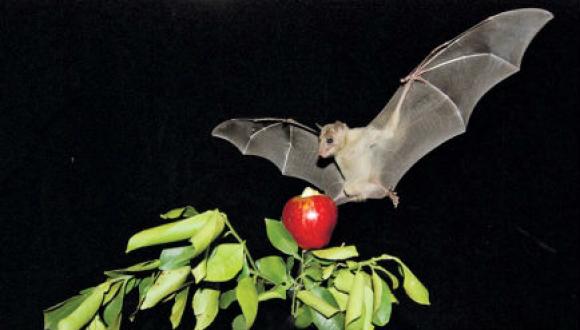New Bat Laboratory to Help Decipher Human Neurology
New, first-of-its-kind laboratory at Tel Aviv University will produce new insights about human neurology by studying bats.
The bumblebee bat (craseonycteris thonglongyai) is the smallest mammal on earth. However despite weighing less than two grams it's capable of flying across tens of kilometers at a time, in complete darkness, finding food and shelter, all thanks to its natural sonar. It's also capable of migrating with the seasons, joining packs of thousands of other bats, and displaying advanced cognitive functions such as advanced learning mechanisms and memory retention.
First-of-Its-Kind, World Class Laboratory
Dr. Yossi Yovel, a Tel Aviv University zoologist who's spent years studying the neurology of bats, is now in the process of establishing the most advanced laboratory in the world for the study of bats. "They're the only mammals in the world that can fly and are, along with dolphins, the only ones to produce energy in order to sense their environment. Their abilities defy the laws of physics and ridicule human engineering, hence my interest in studying them."
A bat's natural sonar is far more advanced than any similar technology humans have been able to develop. In order to study this natural mechanism Tel Aviv University is establishing a new laboratory at the I. Meier Segals Garden for Zoological Research, including the most advanced acoustic aviation rooms in the world, containing over 100 supersonic microphones and over ten high speed video cameras. Understanding more about the sensory capabilities of bats would help advance human sonar and radar technology and help develop new assistive devices for the blind.
The Smallest GPS Trackers in the World
The fruit bats Dr. Yovel and his colleagues observe live in colonies of thousands and return each night during their 40 year lifespan to the same cave where they were born. Since bats spend most of their waking hours in the dark they're forced to rely on a complicated system of vocal cues to recognize each other. Currently Tel Aviv University researchers are working on establishing the first ever bat colony under direct surveillance, where wild bats will live in an artificial facility which they will be able to leave freely each night.
To make following these bats possible researchers at TAU labs have developed the world's smallest GPS trackers – weighing less than five grams – which will also be equipped with microphones and record the noises bats make as they interact with each other in their natural habitat. This will allow data collection over the span of decades for a single colony of mammals and is expected to produce insights about the social structure as well as the neurology of bats.
New Insights about the Human Brain
Behavioral experiments have shown that a bat's brain is capable of measuring time accurately to within100 nano-seconds. In order to understand the ways in which a bat's brain processes its natural sonar mechanisms, social behaviors and other functions researchers at TAU will be using fMRI technology, for the first time in history, in the study of bats.
"Our aim is to decipher human behavior," says Dr. Yovel, "To understand how our brains process sensory input and how it then shapes our behavior. I try to study behavior on all levels – in the field, in the lab, and inside the brain itself. To accomplish this I use a model animal (a bat) which behaves similarly to humans but is less complicated and easier to observe and decipher. Bat colonies, for example, are made up of thousands of animals interacting with each other in small groups with no clear hierarchy. I believe studying mammals with simpler behavioral patterns will allow us to learn a lot about humans."






